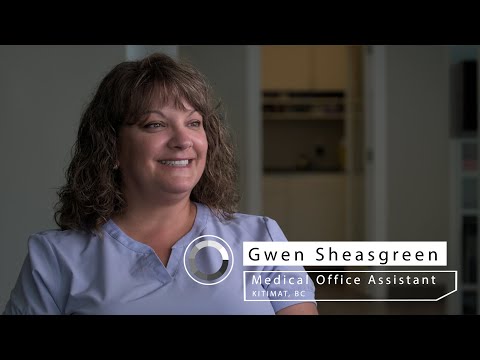Career Overview
Medical administrative assistants carry out a variety of administrative duties to help doctors’ offices, dentists’ offices, hospitals and medical clinics run smoothly.
Job Titles
Duties
Medical administrative assistants:
- Schedule and confirm medical appointments
- Manage communication between medical staff and patients
- Enter and format electronic medical reports and correspondence
- Prepare spreadsheets and documents for review
- Interview patients to gather information for forms and case histories
- Complete insurance forms and other claim forms
- Manage confidential medical files and records
- Prepare exam rooms between patients
- Draft agendas and minutes for meetings
- Prepare financial statements and bills
- Set up and maintain systems for document tracking, filing, monthly reporting as well as other office procedures
- Order supplies and manage inventory
- May supervise and train other staff
Earnings
Earnings is income that workers receive in exchange for their labour. Depending on the type of employment, earnings can be in the form of wages (hourly), salaries (fixed monthly or annual) or self-employed earnings.
Work Environment
# Workers Employed
4,445% Employed Full Time
49%Medical administrative assistants work in the offices of health care professionals. Hours usually match clinic hours, which may include evenings and weekends. Administrative assistants in hospital wards may work shifts.
Medical administrative assistants sometimes deal with difficult patients. Tact and strong people skills are important, as is the ability to work well under pressure.
The work of a medical administrative assistant mostly takes place on a computer. Individuals may get back or neck pain from sitting at desks for long periods, or eye strain from viewing computer monitors.
In addition, because they are in contact with patients, they must take steps to protect themselves from illness.
Career Pathways
Medical administrative assistants often start as receptionists for general practice clinics or as records clerks for hospitals. With experience, they may find jobs in specialist practices or move into supervisory positions, such as office manager or clinic manager.
Occupational Interests
It’s important to understand what kinds of occupations align with your interests.
For more about occupational interests visit Skills for the Future Workforce > Characteristics.
Here are the top occupational interest(s) for this career profile:
Education, Training and Skills
Medical administrative assistants need a high school diploma. Most positions also require a related certificate or diploma, for example medical office assistants (MOA) or dental office assistants.
In addition, some jobs require training in medical terms, medications (“pharmacology”), management software, basic medical office procedures or electronic medical record (EMR) systems.
Other useful qualifications include:
- Typing speed of at least 50 words per minute
- Knowledge of spreadsheet and database software
- WorkSafeBC Occupational First Aid Level 1 certification
- CPR Level C certification
- Workplace Hazardous Materials Information System (WHMIS) certification
Education programs in B.C.

Top Skills
Every job calls for a certain set of skills. Knowing those skills is the first step in finding a good career fit.
Here, you will find the 10 most relevant workplace skills. Some are more important to achieving success in a certain career than others. These skills may come naturally to you or you may need to gain them through education, training and experience.
See the list of work-related skills below, ranked in order of importance for this career. Check out the list and see if this career matches your skills—take that first step!
Giving full attention to what other people are saying, taking time to understand the points being made, asking questions as appropriate, and not interrupting at inappropriate times.
Understanding written sentences and paragraphs in work-related documents.
Talking to others to share information effectively.
Communicating effectively in writing as appropriate for the needs of the audience.
Using logic and reasoning to identify the strengths and weaknesses of alternative solutions, conclusions or approaches to problems.
Keeping track of and assessing your performance, other individuals, or organizations to make improvements or take corrective action.
Managing one’s own time and the time of others.
Considering the relative costs and benefits of potential actions to choose the most appropriate one.
Being aware of others’ reactions and understanding why they react as they do.
Being able to solve novel, ill-defined problems in complex, real-world settings.
Labour Market Statistics
Discover data, facts and information that have been gathered and analyzed. Learn about the characteristics of the economy and labour market in B.C.
Employment
Find out about employment types and trends by region and industry.
Employment
4,445Employment by Region







| Region | Employment | % Employment of this Occupation |
|---|---|---|
| Cariboo | 55 | 1.2% |
| Kootenay | 85 | 1.9% |
| Mainland/Southwest | 2,785 | 62.7% |
| North Coast and Nechako | 65 | 1.5% |
| Northeast | 30 | 0.7% |
| Thompson-Okanagan | 690 | 15.5% |
| Vancouver Island/Coast | 725 | 16.3% |
Labour Market Outlook
The B.C. Labour Market Outlook is a 10-year forecast of the expected supply and demand for labour in the province. It’s usually updated every year. The purpose is to provide British Columbians with the knowledge to make informed decisions on careers, skills training, education and hiring.
Forecasted Job Openings (2025-2035)
2,610Forecasted Job Openings
Forecasted Employment Growth Rate
Composition of Job Openings
Job Openings by Region (2025-2035)







| Region | Job Openings | Avg. Annual Employment Growth |
|---|---|---|
| Cariboo | 30 | 1.6% |
| Kootenay | 60 | 2.2% |
| Mainland/Southwest | 1,650 | 2.2% |
| North Coast and Nechako | 30 | 1.9% |
| Northeast | 10 | 1.2% |
| Thompson-Okanagan | 410 | 2.1% |
| Vancouver Island/Coast | 420 | 2.2% |
Industry Highlights
Learn about the opportunities in B.C.'s major industries, including employment trends, earning potential, locations of work and more.
Forecasted Job Openings by Industry
| Industry | Job Openings (2025-2035) |
|---|---|
| Health Care and Social Assistance | 2,500 |
| Professional, Scientific and Technical Services | 40 |
| Retail Trade | 20 |
| Public Administration | 20 |
| Repair, Personal and Non-Profit Services | 10 |
Insights from Industry
As the population expands and ages, more health-care workers are needed in B.C. The majority of job openings in this field, though, come from retirements. Workers with related experience and post-secondary education are in the highest demand.
Technology has become more central to this work. Electronic medical records are replacing paper, and workers must stay up to date with these advances. This shift has also brought more jobs in scheduling and medical billing. It has also led to a high demand for workers with strong skills in computer software and information management technology.
Resources
-
Association of Administrative Professionalswww.canadianadmin.ca
-
B.C. Ministry of Healthwww.gov.bc.ca/health/
-
Doctors of BCwww.doctorsofbc.ca
-
International Association of Administrative Professionals (IAAP)www.iaap-hq.org








